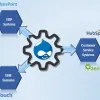Websites can be broadly categorized into two types: those that do not require user authorization (e.g., public portals, news sites) and those that do, to access personal data. This personal data can be non-sensitive (like saved preferences or search history) or highly sensitive (such as order history or banking details). The level of required security for the authorization process directly depends on the type and sensitivity of this data.
On Drupal websites, the default authorization page is a well-known target for spam bots and hackers, particularly for attempts to gain administrative access. To mitigate this risk, it is essential to follow basic security best practices. This includes avoiding generic administrator email addresses (e.g., admin@example.com) and using strong, complex passwords instead of common or weak ones like 'admin' or '123'.
To further enhance security, several advanced measures can be implemented.
Spam Protection
Spam protection services, such as Cloudflare and reCAPTCHA v3, are highly effective at filtering suspicious traffic and form submissions. These services can be configured with various settings, including IP-based blocking and sensitivity levels, which should be fine-tuned for each specific website to balance security and user experience.
Password Management
Robust password management systems can enforce stringent password policies. These systems prevent users from creating weak passwords by requiring complexity and ensuring they are not identical to the user's login or other easily guessable information like their date of birth - Drupal Password Management
Two-Factor Authentication (2FA)
2FA adds an essential layer of security by requiring a second verification step. This can involve entering a code sent via email or an authentication app on a mobile device. Implementing 2FA significantly increases the difficulty for unauthorized users to gain access, even if they have a user's password - Two Factor Authentication - TFA / Passwordless Login.
Separate Login Pages
Another effective security strategy is to create separate, distinct login pages for regular users and administrators. By concealing the administrator login page from the public and search engine indexes, you reduce its exposure to potential attacks. This dedicated page can then have additional security measures, such as 2FA or .htaccess authentication, in place. The Drupal Multiple role login pages module provides a convenient way to implement this separation based on user roles.
Website authorization is a critical component of overall security and should be a top priority in protecting a site from unauthorized access. A combination of these measures provides a comprehensive defense, ensuring maximum protection for both the website and its users.





